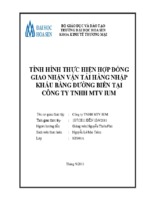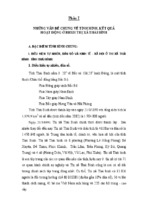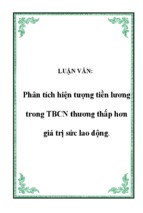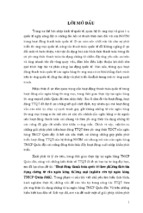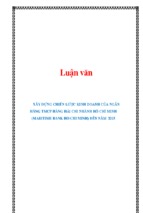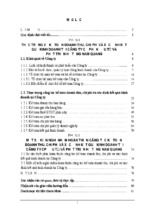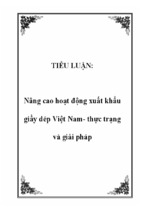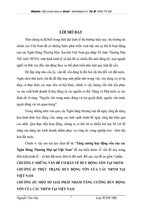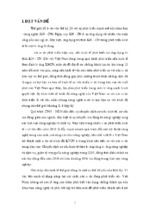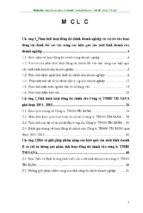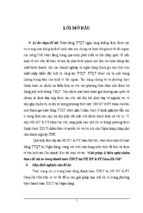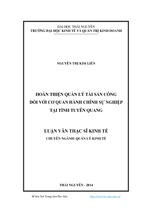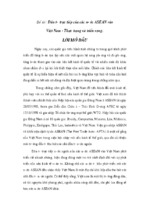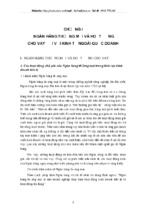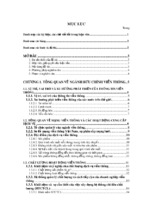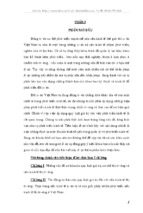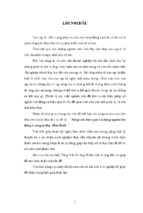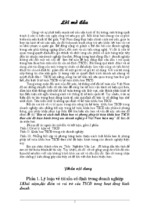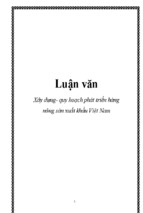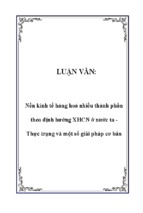1
2
1
2
MINISTRY OF EDUCATION AND TRAINING
UNIVERSITY OF DANANG
TRẦẦN KHÁNH LỘC
DISTINCTIVE SYNTACTIC FEATURES
IN ENGLISH TRADE CONTRACT DRAFTED BY ENGLISH PEOPLE AND VIETNAMESE PEOPLE
Field Study: THE ENGLISH LANGUAGE
Code
:
60.22.15
MASTER THESIS IN THE ENGLISH LANGUAGE
(RESEARCH REPORT)
DANANG, 2011
3
4
Finding out possible solutions to help Vietnamese learners of
Chapter 3: the methodology of research, includes the
English when they draft English trade contract.
methodology study, the research design, the method
1.5 RESEARCH QUESTIONS
collection and data analysis.
To achieve the purposes and objectives of the study, the
following research questions have been raised:
of
data
Chapter 4: the analysis and discussion about distinctive
syntactic features in English trade contract drafted by English people
1. What are syntactic features in English trade contract in
general?
and Vietnamese people.
Chapter 5: conclusion and implication. The conclusion
2. What are distinctive syntactic features in English trade
briefly summarizes the syntactic features in English trade contract.
contract drafted by English people and English trade contract drafted
The implication provides guidance for Vietnamese learners of
by Vietnamese people?
English in drafting English trade contract.
3. What is the implication drawn from the analysis of
syntactic features of English trade contract drafted by English people
and Vietnamese people?
1.6 SCOPE OF THE STUDY
The study is limited in analysing syntactic features such as
commonly used words, phrases, clauses and sentences in English
trade contract drafted by English people and English trade contract
drafted by Vietnamese people.
1.7 7 ORGANISATION OF THE STUDY
The study consists of five chapters:
Chapter
1:
the
introduction,
includes
rationale,
the
justification, the purposes, the objectives, the research questions, the
definitions of terms, the scope of the study, and the organisation of
the study.
Chapter 2: the theoretical background, includes literature
review. Chapter 2 also discusses the description of English syntax.
3
CHAPTER 2
THEORETICAL BACKGROUND
2.1 LITERATURE REVIEW
The concept of trade contract has been studied and discussed
in various books such as “International Trade Contract” written by
Nguyễn Trọng Đàn, “Hợp Đồng Thương Mại Quốc Tế” written by
Nguyễn Văn Luyện and Dương Anh Sơn dealing with the forms of
trade contract and syntactic features in international trade contracts,
“Kỹ Thuật Soạn Thảo Hợp Đồng Kinh Tế” written by Trần Anh
Minh providing readers with the techniques of drafting trade
contracts, “81 Mẫu Hợp Đồng và Văn Bản Quản Lý” written by
Phạm Thanh Phấn and Nguyễn Anh Huy focusing on various types
of trade contract, “Formulation and Translation of International
Business Contracts” written by Hồ Canh Thân, Vương Xuân Huy
and Thân Văn Trinh dealing with basic concepts of contract, contract
formats, the structure of contract and translation criteria of business
contract.
Through different types of books and materials on English
trade contract, a general understanding on the importance of English
trade contract and how to draft English trade contract have been
formed.
However, most of books and authors have not yet studied the
linguistic aspects of English trade contract as well as have not yet
studied the syntactic features in English trade contract drafted by
English people and English trade contract drafted by Vietnamese
people.
4
In the thesis, based on the background knowledge as
presented above, I would like to analyse syntactic features in English
trade contract drafted by English people and English trade contract
drafted by Vietnamese people.
2.2 THEORETICAL BACKGROUND
2.2.1 Discourse Analysis
Stubbs [24, p.1] defines discourse analysis as (a) concerned
with language use beyond the boundaries of a sentence/utterance, (b)
concerned with the interrelationships between language and society
and (c) as concerned with the interactive and dialogic properties of
everyday communication. To some extent, this definition reflects a
very detailed task of discourse analysis. However, Brown and Yule
[2 p.x] recommends that we should adopt a compromise position
which suggests that discourse analysis on the one hand includes the
study of linguistic forms and the regularities of their distribution and
on the other hand, involves a consideration of the general principles
of interpretation by which people normally make sense of what they
hear or read.
2.2.2 The Notion of Discourse
According to Salkie [21, p.ix], discourse is “a stretch of
language that may be longer than one sentence”. Sharing the same
idea with Salkie, Cook [4, p.156] states that discourse is “stretch of
language perceived to be meaningful, unified and purposeful”.
Crystal [5, p.25] focus on the complete form of complex and unified
syntax and discourse “Discourse is a continuous stretch of language
larger than a sentence, often constituting a coherent such as sermon,
argument, joke or narrative”.
3
2.2.3 Discourse and Text
Salkie [21, p.ix] views Text and Discourse the same term for
4
A phrase is a group of words without a finite verb, especially
one that forms part of a sentence [Hornby: 13, p.949].
a stretch of language possibly longer than a sentence. Halliday and
Leech [15, p.361] defines:
Hassan [9, p.23] do not provide a very clear cut between the two
“A phrase is a unit of grammar.
terms as they use discourse to explain text “A text is a passage of
We build clauses and sentences out of phrase.
discourse”.
A phrase may consist of one word or more than one word.”
2.2.4 Cohesion and Coherence
2.2.4.1 Cohesion
As dealing with the term Cohesion, both Cook [3, p.14] and
b. Types of phrases
According to Eastwood [7, p.3], Leech [15, p.361], there are
five major types of phrases: noun phrase, verb phrase, prepositional
Wright and Hope [27, p.164] mention formal links – the links
phrase, adjective phrase, and adverb phrase.
represented on the surface of formal linguistics. Cook states “Formal
2.2.6.2 Clauses in English
links between sentences and between clauses are known as cohesive
a. Definition
devices” and these links are listed as verb form, parallelism,
referring expressions, repetition and lexical chains, substitutions,
ellipsis, conjunction.
2.2.4.2 Coherence
According to Delahunty and Garvey [6, p.360], coherence is
“the property of a text by which its various parts create a natural
sense of connectedness around a central topic”.
2.2.5 Definition of Trade Contract
A contract is an official written agreement [Hornby: 13,
p.268].
A clause is a group of words that includes a subject and a
verb, and forms a sentence or part of sentence [Hornby: 13, p.215].
Maclin [18, p.76] defines “a clause is a group of words that
has a subject-verb combination in it”.
b. Classification
Clauses can be classified by structures, by relationship or by
syntactic functions
By structures
By structures, clauses consists of finite clauses, non-finite
clauses and verbless clauses
A contract is a legally enforceable agreement between two or
more parties with mutual obligations. [Internet: 28]
2.2.6 Description of English syntax
By relationship
By relationship, clause consists of independent clause and
dependent clause
2.2.6.1 Phrases in English
By functions
a. Definition
By functions, there are following categories of dependent
clauses: Adjective clause, Nominal clause, and Adverbial clause.
3
4
2.2.6.3 Sentences in English
In conditional sentence type 3, the verb in the if-clause is in
a. Definition
the past perfect tense, the verb in the main clause is in the perfect
According to Frank [8, p.220], there are two traditional ways
of defining a sentence.
because the action in the if-clause did not happen [Thomson and
By meaning, a sentence is a complete thought.
Martinet: 23, p.200].
By function, a sentence consists of a subject and a predicate.
b. Classification
Sentences are generally classed in 2 ways: by purpose and by
structure.
By purpose
By purpose, sentence consists of 4 kinds: Declarative
sentences
(Statements),
conditional. The time is passed and the condition cannot be fulfilled
Interrogative
sentences
(questions),
Exclamatory sentences (Exclamations), and Imperative sentences.
By structure
By structure, sentences are divided in to four different
sentence types: simple sentence, complex sentence, compound
sentence and compound-complex sentence.
2.2.6.4 Conditional sentences in English
a. Conditional sentence type 1
In conditional sentence type 1, the verb in the if-clause is in
the present tense, the verb in the main clause is in the simple future.
[Thomson and Martinet: 23, p.197].
b. Conditional sentence type 2
In conditional sentence type 2, the verb in the if-clause is in
the past tense, the verb in the main clause is in the conditional tense
[Thomson and Martinet: 23, p.198].
c. Conditional sentence type 3
3
CHAPTER 3
METHODOLOGY OF RESEARCH
4
3.4 DATA ANALYSIS
Data analysis is considered as the most important to point out
the main distinctive syntactic features in English trade contract. It is
3.1 1 METHODOLOGY OF STUDY
A number of English trade contracts drafted by English
the core process to ensure the objectives and result of the study.
3.5 DESCRIPTION OF SAMPLES
people and English trade contracts drafted by Vietnamese people
20 samples of English trade contracts drafted by English
have been collected. After the accomplishment of selection and
people and 20 samples of English trade contracts drafted by
collection, an analysis has been made to analyze syntactic features of
Vietnamese people are collected for analysis. These samples
English trade contract. After that, the author will analyze distinctive
taken from businesses and companies in Vietnam, from materials and
syntactic features in English trade contract drafted by English people
from the Internet.
and English trade contract drafted by Vietnamese people.
3.2 RESEARCH DESIGN
The content of research has been designed so that it can lead
readers gradually from the general viewpoints into practical use in
English trade contract.
The key to the content of research is data collection,
selection, analysis and conclusion which is carried out as followed:
Collecting and studying books and materials which are
related to the research from many sources such as libraries, teachers
of English, friends, internets and companies in Vietnam in order to
understand the theoretical background of the study.
Consulting teachers of English and my supervisor for advice
and necessary information.
Studying and analysing the materials by classifying, listing,
selecting and systematising the information.
3.3 DATA COLLECTION
The process of data collection has been done from businesses
and companies in Vietnam, from materials and the Internet.
are
3
4
CHAPTER 4
Table 4.4 Typical Structure used with “hereby”
ANALYSIS AND DISCUSSION ABOUT
SYNTACTIC FEATURES IN ENGLISH TRADE CONTRACT
4.1 COMMONLY USED WORDS IN ENGLISH TRADE
CONTRACT
In international English trade contract, there are several
commonly used words which distinguish English trade contract from
other documents. These words are hereinafter, hereby, herein,
in ETCDBEP and ETCDBVNP
Structure used with “hereby”
N (name of parties)
commonly used word
V
AAA Assurance
declares
hereby
Com21
grants
The Licensor
represents
4.1.3 Herein
The meaning of the adverb herein is “in this document or
hereto, therefrom, thereto.
statement” [Hornby: 13, p.608]. Herein is often used in the Article 1
4.1.1 Hereinafter
(Object of Contract) of international English trade contract.
The meaning of hereinafter is “in the rest of this document”
[Hornby: 13, p.608]. It often appears in the structure of the names of
parties in English trade contract.
Table 4.3 Typical Structure used with “hereinafter” in
ETCDBEP and ETCDBVNP
Structure used with “hereinafter”
commonly used word
V-ed
called
Table 4.5 Typical Structures used with “herein”
in ETCDBEP and ETCDBVNP
N or NP
Structure 1 The Licensee
The Parties’ duty of confidentiality
V-ed
Structure 2 provided
licensed
4.1.4 Hereto
herein
herein
herein
herein
defined
Hereto is an adverb, and its meaning is “to this” [Hornby:
referred
hereinafter
13, p.608]. Hereto is often used in the part Specifications of Goods
described
4.1.2 Hereby
Hereby is an adverb and its meaning is “in a way that makes
something legal” [Hornby: 13, p.608]. Hereby is often used in the
Articles of English trade contract.
of international English trade contract.
Table 4.6 Typical Structures used with “hereto”
in ETCDBEP and ETCDBVNP
Structure 1
N or NP
the parties
Schedule A
Structure 2
hereto
V-ed
hereto
hereto
attached
hereto
3
4
4.1.5 Therefrom
Table 4.9 Number of Occurrence of Commonly used Words
The meaning of the adverb therefrom is “from the
in ETCDBEP and ETCDBVNP
thing mentioned” [Hornby: 13, p.608]. In international English
Order
trade contract, therefrom often appears in the Articles.
Table 4.7 Typical Structures used with “therefrom” in ETCDBEP
V-ing
therefrom
arising
therefrom
Structure 2
V-ed
therefrom
caused
therefrom
derived
4.1.6 Thereto
The meaning of the adverb thereto is “to the thing
mentioned” [Hornby: 13, p.1347]. Like the adverb therefrom, the
adverb thereto also appears in the Articles in international English
trade contract.
Table 4.8 Typical Structure used with
“thereto”
in ETCDBEP and ETCDBVNP
Structure used with “thereto”
NP
thereto
the obligations of the
the requirements of the contract
ETCDBEP
ETCDBVNP
1
hereinafter
34 (45,3%)
41 (54,7%)
2
hereby
238 (58,2%)
171 (41,8%)
3
herein
274 (62,8%)
162 (37,2%)
4
hereto
168 (57,5%)
124 (42,5%)
5
therefrom
73 (58,4%)
52 (41,6%)
thereto
282 (74,6%)
96 (25,4%)
4.2 PHRASES IN ENGLISH TRADE CONTRACT
4.2.1 Adjective Phrases
4.2.1.1 Responsible for
The meaning of the adjective phrase responsible for is
“having duty of something” [Hornby: 13, p.1088]. The adjective
phrase responsible for is used to express obligation and duties in the
contract.
4.2.2.2 Liable to / for
The meaning of the adjective phrase liable to / for is
“legally responsible for something” [Hornby: 13, p.739]. In
international English trade contract, the adjective phrase liable to /
Partnership
all references
Number of occurrence
6
and ETCDBVNP
Structure 1
Words
thereto
for is used to express the duties related to legal aspect.
Table 4.13 Number of Occurrence of Adjective Phrases in
ETCDBEP and ETCDBVNP
and any amendments
Order
Adjective
Number of occurrence
Phrases
ETCDBEP
ETCDBVNP
1
responsible for
156 (61,9%)
96 (38,1%)
2
liable for / to
113 (57,3%)
84 (42,7%)
3
4
4.2.2 Prepositional Phrases
In
international
prepositional
phrases
in conformity with is “following the rule legal documents
English
are
trade
according
contract,
to,
in
the
case
typical
or regulations” [Hornby: 13, p.258].
of,
4.2.2.6 With respect to
in
connection with, in accordance with, with respect to, under the
Like the prepositional phrase in accordance with and in
contract.
conformity with, the prepositional phrase with respect to is also used
4.2.2.1 According to
in formal writing. In international English trade contract, the meaning
The meaning of the prepositional phrase according to is
“as stated or reported by somebody or something” [Hornby: 13,
p.8]. This prepositional phrase is often used in the Articles of
of the prepositional phrase with respect to is “concerning” [Hornby:
13, p.1088).
Table 4.16 Typical Structures used with Prepositional Phrases in
contracts.
4.2.2.2 case of
The meaning of the prepositional phrase in case of is “if
ETCDBEP and ETCDBVNP
Order
1
Commonly used PP
according to
something happens” [Hornby: 13, p.180]. In English trade contract
drafted by English people and English trade contract drafted by
Vietnamese people, the prepositional phrase in case of often stands
at the beginning of the sentence.
4.2.2.3 connection with
The prepositional phrase in connection with is often used in
formal writing. The meaning of the prepositional phrase in
connection with is “for reasons connected with something”
[Hornby: 13, p.260].
with is “according to a rule” [Hornby: 13, p.8]. In international
2
in case of
4.2.2.5 conformity with
The prepositional phrase in conformity with is often used in
formal writing. In international English trade contract, the meaning of
the seller’s delay
dispute relating to this contract
3
in connection with
the operation of the Business
this contract
4
in accordance with
the provisions of the Contract
the law of the State of Colorado
5
in conformity with
appropriate international
regulations
the Law on Foreign Investment
6
with respect to
terms and conditions of this
Agreement
English trade contract, the prepositional phrase in accordance
with has the meaning related to legal aspect.
the Laws in force in Danang
the terms of this Agreement
4.2.2.4 accordance with
The meaning of the prepositional phrase in accordance
NP
the proposed change
4.2.2.7 Under the contract
The meaning of the prepositional phrase under the contract
3
4
is “according to the contract” [Hornby: 13, p.268).
4.3.2 Adverbial Clause
Table 4.17 Number of Occurrence of Prepositional Phrases in
ETCDBEP and ETCDBVNP
Order
Prepositional
Phrases
In English trade contract drafted by English people and
Vietnamese people, adverbial clause of time is commonly used.
Number of occurrence
ETCDBEP
Table 4.22 Number of Occurrence of Adverbial Clauses in
ETCDBVNP
ETCDBEP and ETCDBVN
1
according to
67 (53,6%)
58 (46,4%)
2
in case of
158 (62,7%)
94 (37,3%)
3
in connection with
285 (59,2%)
196 (40,8%)
1
4
in accordance with
253 (58,3%)
181 (41,7%)
5
in conformity with
182 (67,9%)
6
with respect to
7
under the contract
Order
ETCDBVN
until
124 (59,9%)
83 (40,1%)
2
when
156 (57,5%)
115 (42,5%)
86 (32,1%)
3
before
87 (51,2%)
83 (48,8%)
216 (58,3%)
154 (41,7%)
4
after
96 (55,1%)
78 (44,9%)
147 (66,2%)
75 (33,8%)
SENTENCES IN ENGLISH TRADE CONTRACT
4.4.1 Simple Sentence
4.3 CLAUSES IN ENGLISH TRADE CONTRACT
A simple sentence is one independent clause [Oshima &
4.3.1 Adjective Clause (Relative Clause)
In international English trade contract, relative pronouns
Hogue: 19, p.156]. In English trade contract, simple sentence is often
used in the Articles.
used in relative clause are mainly who and which.
Table 4.20 Number of Occurrence of Adjective Clauses in
4.4.2 Compound Sentence
In English trade contract, two clauses in compound sentence
ETCDBEP and ETCDBVNP
Adjective Clauses
Clauses
Number of occurrence
ETCDBEP
4.4
Order
Adverbial
Number of occurrence
ETCDBEP
ETCDBVN
are combined with a coordinator or with a semicolon.
4.4.3 Complex Sentence
1
relative pronoun who
183 (59,6%)
124 (40,4%)
In English trade contract drafted by English people and
2
relative pronoun which
217 (56,8%)
165 (43,2%)
English trade contract drafted by Vietnamese people, there are three
3
relative pronoun that
152 (60,8%)
98 (39,2%)
kinds of dependent clause used in complex sentences.
4
relative clauses replaced
226 (58,1%)
163 (41,9%)
4.4.4 Compound - Complex Sentence
by participle
In English trade contract drafted by English people and
Vietnamese people, the dependent clause used in compound complex
3
4
sentence is mainly dependent adverb clause beginning with adverbial
CHAPTER 5
subordinator If.
CONCLUSION AND IMPLICATION
4.5 CONDITIONAL
SENTENCE
IN ENGLISH
5.1 CONCLUSION
TRADE CONTRACT
The conditional sentence used in English trade contract is
The syntactic features in English trade contract drafted by
conditional sentence type 1. Conditional sentence type 1 is a
English people and Vietnamese people is not only necessary for
syntactic feature of English trade contract.
teachers of English but also for business people who want to improve
Table 4.28 Typical Structures of Conditional Sentence Type 1 in
their skills in understanding and drafting English trade contract.
ETCDBEP and ETCDBVNP
Studying English trade contract requires a hard working and
Structure 1
Structure 2
If-clause
Main clause
S +V (simple present)
S + will / shall + V
If-clause
Then
Main clause
S +V (simple present)
Then
S + will / shall + V
Table 4.29 Conditional Sentence Type 1 in ETCDBEP and
ETCDBVNP
Conditional
passionate job.
In international English trade contract, there are many
commonly used words which distinguish English trade contract from
other documents. They are characteristic of English trade contract
and are used in most of English trade contract drafted by English
people and English trade contract drafted by Vietnamese people.
These words are hereinafter, hereby, herein, hereto, therefrom,
Number of occurrence
thereto.
Order
Sentence
ETCDBEP
ETCDBVNP
A large number of adjective phrases and prepositional phrases are used in international English trade contract drafted by English people and
1
Type 1
352 (56,0%)
276 (44,0%)
Vietnamese people. In general, the meaning of typical adjective phrases such as responsible for, liable for / to, and the meaning of typical prepositional phrases
2
Type 1 with “then”
143 (63,0%)
84 (37,0%)
such as according to, in conformity with, in accordance with, in connection with in international English trade contract are related to legal aspects.
In practice, all four types of sentences are used in
English trade contract. In addition, a large number of conditional
sentences
25
26
are used in English trade contract drafted by English people and
conditional sentence type 1 are used in most of English trade contract
Vietnamese people.
drafted by English people and Vietnamese people .
The conditional sentence used in English trade contract is
I hope that the analysis of distinctive syntactic features in
conditional sentence type 1. Conditional sentence type 1 is a
English trade contract drafted by English people and English trade
syntactic feature of English trade contract. A large number of
contract drafted by Vietnamese people will be useful for students and
conditional sentence type 1 are used in most of English trade contract
readers. The analysis of distinctive syntactic features in English trade
drafted by English people and English trade contract drafted by
contract drafted by English people and Vietnamese people will
Vietnamese people.
contribute to the study of language in English trade contract and will
5.2 2 IMPLICATION
help students succeed in understanding and drafting English trade
Being teachers, we should remind students distinctive
syntactic features in English trade contract drafted by English people
and Vietnamese people.
When students draft an English trade contract, they need to
understand the meaning and the use of the adverbs hereinafter,
hereby, herein, hereto, therefrom, thereto. These words are used in
formal writing as well as in most of English trade contracts.
It is important to understand the meaning, the structure and
the use of the distinctive adjective phrases responsible for, liable to
and prepositional phrases according to, in case of, in connection
with, in accordance with, with respect to, under the contract in
international English trade contract drafted by English people and
Vietnamese people .
Students must pay attention to the conditional sentence type
1 used in English trade contract. Conditional sentence type 1 is a
syntactic feature of English trade contract. A large number of
contract.
- Xem thêm -

